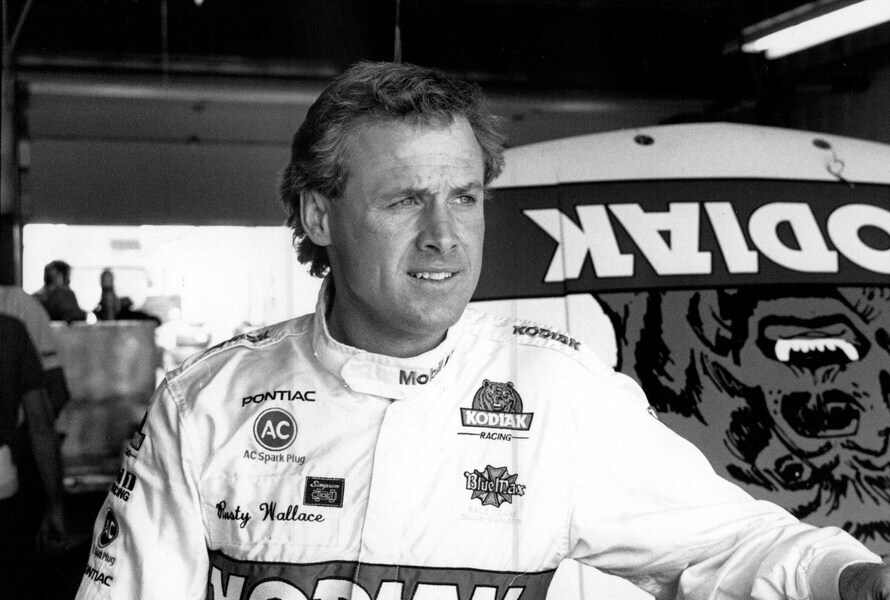
Rusty Wallace began racing at smaller tracks near his Missouri home in the late 1970s. He captured the USAC Stock Car Rookie of the Year award in 1979 and the ASA championship four years later. In his very first NASCAR race at the Atlanta 500 in 1980, Rusty drove his Chevrolet to a second-place finish, taking the checkered flag just 10 seconds behind winner Dale Earnhardt. He began racing on the NASCAR circuit full time in 1984. He scored his first win at Bristol in 1986 and added a second that year at Martinsville. He scored two more wins during the '87 season, then went on a tear: six victories in 1988, when he came in second behind Bill Elliott in the Cup championship, and six more in '89, winning the season crown. After 5 wins over the next three years, Wallace achieved a career-high 10 wins in 1993, when he was runner-up to Earnhardt for the championship. His eight victories the following year left him third in the championship race. Rusty scored 15 more wins from 1995 to 2002, and though he never won another championship, he was in the top ten in points every year. He won his final race in 2004 at Martinsville Speedway. He retired from the Cup circuit after the 2005 season. During 2006, Rusty covered the Indy Racing League, and subsequently provided commentary for NASCAR events on ABC and ESPN. Besides broadcasting, he also runs Rusty Wallace, Inc., which campaigns a NASCAR Nationwide series car driven by his son, Steve. Wallace’s 55 career wins rank 8th all-time.
By George Damon Levy
Make you a little wager. That by the end of the little discussion we’re about to have, you’re going to hold one Russell William “Rusty” Wallace Jr. in even higher esteem than you already do.
Even possibly if your name happens to be Rusty Wallace Jr. It’s not that anyone thinks the Missouri native was anything less than one of the greatest drivers of his generation. Hell, NASCAR voted him one of The 50 Greatest NASCAR Drivers of All Time during its 50th anniversary celebration. (An honor he shares with fellow 2014 inductee Marshall Teague.) It’s just that when you look back on his career, you realize the things he accomplished are even greater than you remember.
He’s Number 9 in all-time wins with 55. Number 3 in road course victories behind Jeff Gordon and Tony Stewart. And Number 1 all-time in short-track wins with 34. Let that sink in for a minute: The greatest NASCAR short-track driver of all time.
Not to mention Wallace won at least one race for 16 straight seasons. The only two people to win more are David Pearson (17) and the King himself, Richard Petty, with 18. So what drove Wallace to the success he achieved?
“Racing is all I ever knew—all I ever wanted to do,” says Wallace, “from the time I was a little kid. I used to follow my Dad, Russ, to all of the local short tracks around St. Louis and I was just hooked.”
Wallace was unusual too in that he understood cars better than most drivers. Knew the way they worked. Knew what it took to make them work better. “I think a lot of people in the garage knew what a hands-on kind of driver I was. I always took pride in understanding all aspects of my car. I felt that if you didn’t understand the car, you couldn’t effectively tell your guys what it was doing.”
Wallace won one championship, in 1989, driving for owner and fellow 2014 inductee Raymond Beadle. He could have won several more. In ‘88, he tied Bill Elliott with 6 wins apiece but lost the title by a paper-thin 24 points. In ‘93, driving for Roger Penske, he won a season- and career-high 10 races to Dale Earnhardt’s 6, but again fell just short at a time when NASCAR rewarded consistency more than victories.
Wallace’s 10 W’s that year showed his human side as well. At the conclusion of each, he did a “Polish Victory Lap” in honor of friend and 1992 champ Alan Kulwicki who’d perished in an aircraft accident earlier in the season.
So which of his achievements does he hold closest to his heart? “Honestly, all of the wins and my championship definitely meant a lot to me, but I think that the achievements that mean the most came after I finished driving.
“Being inducted into the racing Halls of Fame, like the NASCAR Hall of Fame, here at the Motorsports Hall of Fame of America, the International Motorsports Hall of Fame and the National Motorsports Press Association Hall of Fame—those achievements really mean a lot to me.”
And you can’t be held in any higher esteem than that.
MSHFA 1995 Inductee Roger Penske (R) with Rusty Wallace
(MSHFA)